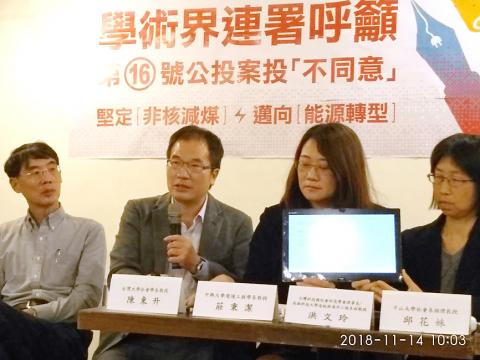A group of academics yesterday urged voters to reject a referendum seeking to overturn the government’s policy to phase out nuclear energy, citing risks of nuclear disasters.
The group, led by Academia Sinica academicians Lin Ming-chang (林明璋), National Chung Hsing University environmental engineering professor Tsuang Ben-jei (莊秉潔), National Taiwan University geoscience professor Chen Wen-shan (陳文山) and several other academics, earlier this month launched a petition advocating their position.
As of yesterday, the petition had collected 559 signatures from academics, the group told a news conference in Taipei.

Photo: Liu Li-jen, Taipei Times
The referendum, one of 10 to be held alongside the nine-in-one elections on Saturday next week, asks voters whether they agree to scrap Article 95, Paragraph 1 of the Electricity Act (電業法), which stipulates that all nuclear power generation facilities must cease operations by 2025.
The article was introduced in January last year as a result of President Tsai Ing-wen (蔡英文) campaign pledge to create a “nuclear-free homeland.”
If the referendum is passed, three nuclear power plants that are scheduled to be decommissioned between the end of this year and 2024 would continue to operate and the Fourth Nuclear Power Plant, which has been mothballed since 2014, could be activated for the first time.
“The referendum pegs its hopes on old nuclear power plants scheduled for decommissioning and the unfinished Fourth Nuclear Power Plant, even though little has changed since 2014: The plants still face risks of earthquakes and tsunamis, and some of them are in the Taipei metropolitan area,” the academics said in a joint statement.
“The government has yet to make plans for the final disposal of nuclear waste, Taiwan Power Co still has a poor safety record and the Fourth Nuclear Power Plant has yet to pass safety tests,” the statement said.
With extreme weather events becoming more frequent, the risk of a nuclear disaster is also increasing, it said, urging the public to vote “no” in the referendum and support clean energy sources as alternatives to nuclear power.
Taiwan is “not ideal for nuclear plants,” considering it has 33 active faults, with some near the three operating nuclear plants and more suspected off the coast near the Fourth Nuclear Power Plant, Chen said.
Nuclear plants would continue causing safety concerns among nearby residents even after they are decommissioned, he said, adding that the three operating nuclear plants could end up being used as warehouses to store spent nuclear fuel if the government fails to solve the problem of nuclear waste disposal.
“If the Fourth Nuclear Power Plant were to experience a nuclear disaster like the Fukushima Dai-ichi nuclear power plant did in 2011, areas within a 20km radius of the plant would have to be permanently evacuated. This would include Taipei, New Taipei City, Keelung, Taoyuan and parts of Hsinchu, affecting a population of 8 million,” Tsuang said, adding: “It is something the nation cannot afford to happen.”

A magnitude 4.9 earthquake struck off Tainan at 11:47am today, the Central Weather Administration (CWA) said. The hypocenter was 32.3km northeast of Tainan City Hall at a depth of 7.3km, CWA data showed. The intensity of the quake, which gauges the actual effect of a seismic event, measured 4 in Tainan and Chiayi County on Taiwan's seven-tier intensity scale, the data showed. The quake had an intensity of 3 in Chiayi City and County, and Yunlin County, while it was measured as 2 in Kaohsiung, Nantou County, Changhua County, Taitung County and offshore Penghu County, the data showed. There were no immediate reports of

Weather conditions across Taiwan are expected to remain stable today, but cloudy to rainy skies are expected from tomorrow onward due to increasing moisture in the atmosphere, according to the Central Weather Administration (CWA). Daytime highs today are expected to hit 25-27°C in western Taiwan and 22-24°C in the eastern counties of Yilan, Hualien, and Taitung, data on the CWA website indicated. After sunset, temperatures could drop to 16-17°C in most parts of Taiwan. For tomorrow, precipitation is likely in northern Taiwan as a cloud system moves in from China. Daytime temperatures are expected to hover around 25°C, the CWA said. Starting Monday, areas

The Chinese Nationalist Party (KMT) is maintaining close ties with Beijing, the Democratic Progressive Party (DPP) said yesterday, hours after a new round of Chinese military drills in the Taiwan Strait began. Political parties in a democracy have a responsibility to be loyal to the nation and defend its sovereignty, DPP spokesman Justin Wu (吳崢) told a news conference in Taipei. His comments came hours after Beijing announced via Chinese state media that the Chinese People’s Liberation Army’s Eastern Theater Command was holding large-scale drills simulating a multi-pronged attack on Taiwan. Contrary to the KMT’s claims that it is staunchly anti-communist, KMT Deputy

RESPONSE: The government would investigate incidents of Taiwanese entertainers in China promoting CCP propaganda online in contravention of the law, the source said Taiwanese entertainers living in China who are found to have contravened cross-strait regulations or collaborated with the Chinese Communist Party (CCP) could be subject to fines, a source said on Sunday. Several Taiwanese entertainers have posted on the social media platform Sina Weibo saying that Taiwan “must be returned” to China, and sharing news articles from Chinese state media. In response, the Mainland Affairs Council (MAC) has asked the Ministry of Culture to investigate whether the entertainers had contravened any laws, and asked for them to be questioned upon their return to Taiwan, an official familiar with the matter said. To curb repeated